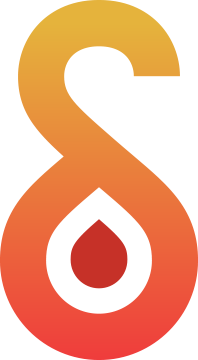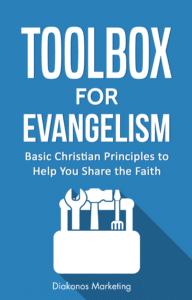Virtual Bible Summit 2022 is officially in the books.
Two days of great Bible teaching from twelve speakers located across the country, all pouring their hearts out in a virtual format with pre-recorded lessons. Anyone that watched benefitted — of that, I have no doubt — but how “successful” was it?
It’s hard to measure success, honestly. Marketing is such a fluid concept; it describes both awareness and hard metrics like conversions and click-through rates. Something can be a “success” because it had an effective campaign, but still fall way short because you didn’t reach the right audience. Or the right audience didn’t care. Or the right audience cared, but didn’t know where to go. All of those things can tank any event, especially an online event.
The goal for this year’s VBS was pretty simple: to get as many people as possible to watch the lessons. Done. Nothing else. There was no pitch on the back-end to get anyone to sign up for services, no plea from the speakers to study with them afterwards.
Nothing at all. Strictly view count.
Since it was the first year we did it, VBS 2020 was the benchmark for success. That year, we had close to 60,000 views in the first 24 hours. That’s an incredible number, and one that can be owed to a lot of different factors.
The biggest factor, bar none, in 2020’s success was the fact that Covid-19 had just hit two weeks earlier. Churches were reeling, preachers were scrambling, and people were left without a local service to attend for weeks.
In short, they were hungry for some kind of spiritual engagement. VBS 2020 provided that avenue for them.
It was truly a “lightning in a bottle” type of event that I knew we wouldn’t be able to recapture.
But we should be able to still generate a respectful amount of eyeballs since the event was completely online, right?
RIGHT?

What I Planned
Winston Churchill famously said, “Plans are of little importance, but planning is essential.” Good planning is essential. Without it, you’re just kinda shooting from the hip as to what you think will work. Data needs to be compiled, audience selection is key, as is execution.
But as Mike Tyson also once said, “Everyone has a plan until they get punched in the mouth.”
It’s important to plan, but it might be even more important to be flexible and adapt to various circumstances that arise. The ability to pivot is what separates great events from mediocre.
Timeline
After choosing not to have VBS 2021 (first big mistake since the reception from 2020 was so positive — always listen to your audience), we started planning for VBS 2022 sometime in mid-January. We chose a topic, selected some speakers, and then started reaching out to speakers in February.
Unfortunately, we didn’t start advertising the VBS until May, which is my biggest regret over this whole thing. Marketing takes time, and I thought I could take a shotgun approach near the end — sort of like a marketing blitzkrieg — to generate quick awareness rather than a slow-and-steady-wins-the-race type of approach.
That’s what worked in 2020, so I (wrongly) assumed it work well for us in 2022. For the reason why, see “lightning in a bottle” quote above.
This is a lesson for all of us: When you’re planning an event, start as early as possible. Most churches schedule their meetings out a year in advance. Get the landing page and ads going around six months out to maximize the effect.
The earlier you can plant an event in someone’s mind, the longer you have to nurture it, and the better chance they’ll have to remember it.
Audience
We had a specific budget in mind for advertising, but the problem is trying to attract the right kind of audience.
I know what you’re thinking, “But Brady, this is a Gospel themed event where Biblical sermons are being preached. Why not open it up to everyone?”
You’re right, but VBS also serves as a lead generation device for us, and since we’re bootstrapping the entire process, we have to make every dollar count. As do churches.
The other issue is that too wide of an audience in such a short period of time results in an extremely high cost-per-click (CPC). It naturally limits your potential audience pool, which reduces the amount of ad spend you can effectively use in other channels, such as Google ads, print ads, or even *gasp* Youtube ads.
I believe firmly that the Bible calls on us to be good stewards of our resources, and that includes churches using every dollar as efficiently as possible. It’s one reason why we use a three-pronged approach in our marketing with Gospel Meetings: First the cold audience, next a warm audience, and then, finally, the hot audience. The bang-for-your-buck is much greater the more your audience is warmed up.
Again, time played a big part of this, but what we should have done is have two single ads: One for potential clients, and another for the mass public. Allocating a higher budget to the second would’ve attained a higher reach, which is honestly the whole reason for it anyways. Lead generation would’ve come second, as it should.
Format
Two years ago, VBS 2022 was an all-day affair. It started at 7AM CST and ended at 8PM. It was a great buffet of learning, and I think that really increased the efficiency.
No matter how well the planning goes, at least some people are going to get bored with the same format, so we wanted to provide some variety this year. We had plans to not only host the sessions, but also to split it up into two days, and add in a couple new formats. We wanted to host Q&A’s with different speakers, as well as live roundtables in the evening.
That didn’t happen. For one, life got in the way and we weren’t able to line up schedules. Secondly, the truncated timetable meant that imposing on our speakers to fulfill additional duties would not have produced a good return on investment. They were already putting in a ton of work to record the lessons and write essays (available here!), so asking them to do more made us ask what we could realistically gain.
I still think that online events open up a wealth of opportunities for churches to share the Gospel, and we’re committed to exploring those as we can, but this didn’t seem the right year.
Next year, though…
What Happened
So, after all those dollars spent marketing the summit and hours spent by our speakers recording lessons, what actually happened?
- Lead Generation: 38 new sign ups. Not bad, but faaaar short from what we were hoping.
- Views: 2,023 views.
- Reach: 2,566 organic, 32,320 paid.
- Engagement: 105
- Most Active Demographic: 65+ (for both men and women)
Depending on where you’re sitting, those may be great numbers. Or the worst numbers you’ve ever seen. You may even be laughing at me (please don’t).
The point is, those are a benchmark for future summits. If we assume that 2020 was an anomaly because of the remarkable state that the world was in at that time (and it was), then this is the best true baseline for what we can build off of next year.
Prayerfully, VBS 2023 will reach even more people, have more minutes viewed, and create conversations in people’s lives. That’s the real goal, after all.
What Worked
One of the hopes with our summits is to create a proving ground for different online approaches. I know that are churches don’t always have the freedom to experiment here, so we want to throw everything at the wall and see what sticks.
First, let’s talk about a few things that worked.
The Speakers
I cannot say this enough: The speakers knocked it out of the park this year. Every one of them brought their A game, and all of their videos we’re well-produced and extremely value-packed.
Moreover, every one of them was passionate about their topic…and it showed. BJ’s lesson on vulnerability stands out to me in that regard, but all of them were well done and on point.
They all each shared it within their own networks, which proves once again a central tenet of evangelism: Nothing is as valuable as a personal invitation.
At Diakonos, we’re all about expanding the Gospel online, but that’s only to amplify the in-person inviting and studying and meeting and everything else that churches are already doing. You can have the best websites and social media platforms of any church around, but it won’t matter one bit if the makeup of the church is cold or anti-evangelistic. Study after study shows that nothing is more effective in evangelism than a personal invitation. Nothing. Zip. Nada.
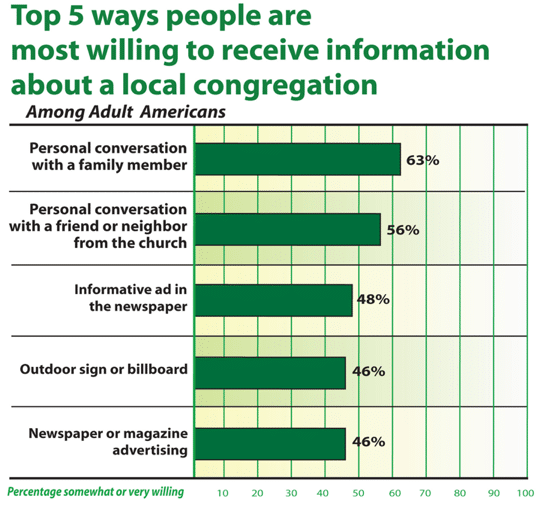
This point is worth reiterating again: The #1 reason we had any level of success was not due to paid ads, but each one of these guys sharing the event in their own circles. The reach may be higher with ads, but the personal attachment and engagement will always be higher with people who feel like they’re receiving a special invitation.
Specificity
Some of the topics for VBS were intentionally broad: love, fellowship, and culture.
Others, on the other hand, were extremely specific. Colton McDaniel’s lesson on “Handling the Cranks” was laser-specific on a singular subject, and — dare I say — one that could’ve been controversial.
Colton could’ve just launched a full-on salvo against everyone that would’ve made him mad at any congregation ever, but had he done that, I suspect he would be spending this week looking for a new church to work with. As it is though, Colton handled it with class and with objectivity.
But Colton’s lesson also ranked among the highest (if not, the highest) in terms of engagement, reach, and views. Why is that? I’m not a psychologist, but I imagine it’s because he tackled a very common problem. The “Cranks” are everywhere, and dealing with them is tough. Colton addressed it head on. That’s exactly what people want to hear.
When brainstorming topics for your next Gospel Meeting or lectureship or small study, it’s tempting to keep it broad, thinking that might attract the most number of people.
That may be true, but anecdotal evidence suggests that more specific studies attract the most engaged parties. People who are looking for a specific problem and can only find it in a few select places.
Is it any wonder why denominations offer divorce counseling, addiction support groups, and financial help seminars? Some of those people will never enter a building to hear the Bible, but they’ll line up for something they feel addresses their specific problems.
I’m not saying we need to offer those services (not at all), but it shows what people want. They feel like they’ve heard the Gospel, but how does it apply to them? Don’t be afraid to tackle controversial subjects straight up; Jesus did it (Matthew 23), you can too.
Accessibility
Nothing really beats Facebook, does it? The social media giant now claims almost half the world’s global population as active users, which means that there’s literally no better way to reach people than by optimizing your platform.
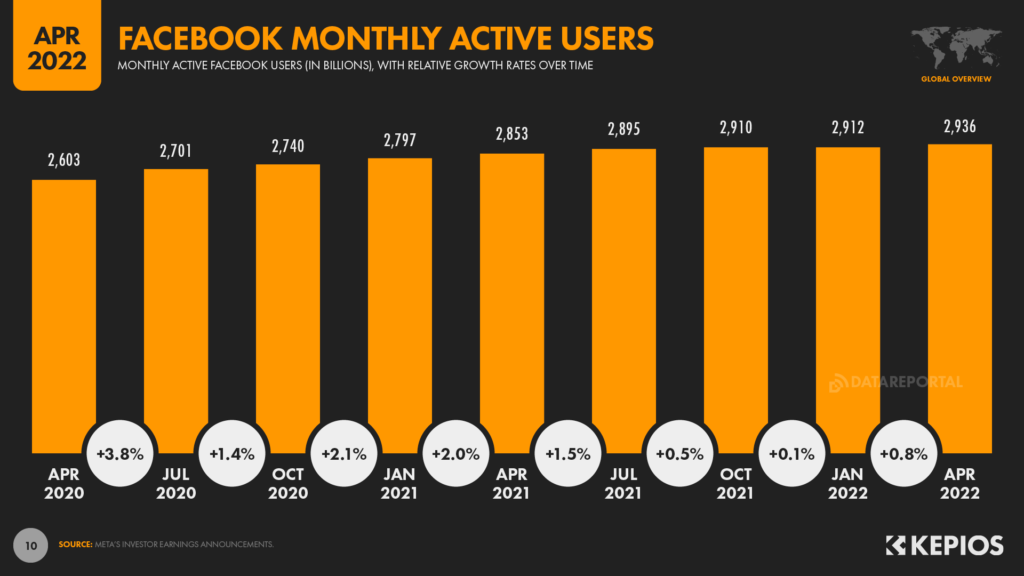
Youtube was a secondary platform, and really saved our bacon when we had some technical issues with streaming the first session of the summit. So glad we uploaded videos to both platforms.
The ability for anybody — whether they were previously aware of what we were doing or not — to simply log on and watch the summit is unmatched. Share-ability, engagement, ease of use — all of those are reasons why Facebook needs to be a part of your arsenal.
What I Learned
Now, on to the fun part! This was such a huge learning experience for me, personally. We didn’t have the “advantage” of a global pandemic to bolster online view counts, so this was the first real attempt at moving the needle with online events.
Here’s what I learned.
Start Marketing as Soon as You Can
This is a point we’ve hammered home — as soon as you possibly can, start the planning for an event. As far out as reasonably possible, start the marketing.
And whatever date you’re thinking for both of those, add a month to it. You’ll need it.
On a personal note, I’ve heard a lot of people bemoan Gospel Meetings and lectureships as either “not being effective” at reaching outsiders, or just traditionally-based evangelism vehicles that are better left in the 50’s.
Neither of those have to be true. We can have better outside attendance from meetings and it can be effective. We just have to be more intentional about getting the message out, especially using the digital tools available to us.
Using those digital tools takes time, so start as soon as possible.
Email Lists are More Valuable Than You Think
When we started marketing for the summit, we had a grand total of 12 people on our email list.
Twelve.
And I personally knew almost each and everyone of them.
But, to be fair, the MyDigitalEvangelism.com website had just started in March, and we hadn’t developed a lead magnet yet. No traffic (organic or paid) equals no list.
Here’s why that’s a problem. Only a percentage of people will ever even open your email (how many are you subscribed to without even knowing it?), and fewer still will ever click through to whatever page it is you want to direct traffic.
These two metrics vary by industry, but they are generally higher than other niches. Open rates for the “religion” industry are 27.62%, while click-through rates hover around 3.16%.
That means, for an average email list of a thousand people, only ~271 will open your email, and ~32 will click through. From that, you can tell why my list size of 12 is virtually ineffective.
The flip side of this is that the return on investment (ROI) from an email list is one of the highest in any industry. For every $1 you spend on email marketing, you can expect to fetch nearly $44 back (how you interpret that ROI for your church is fluid, but the point remains).
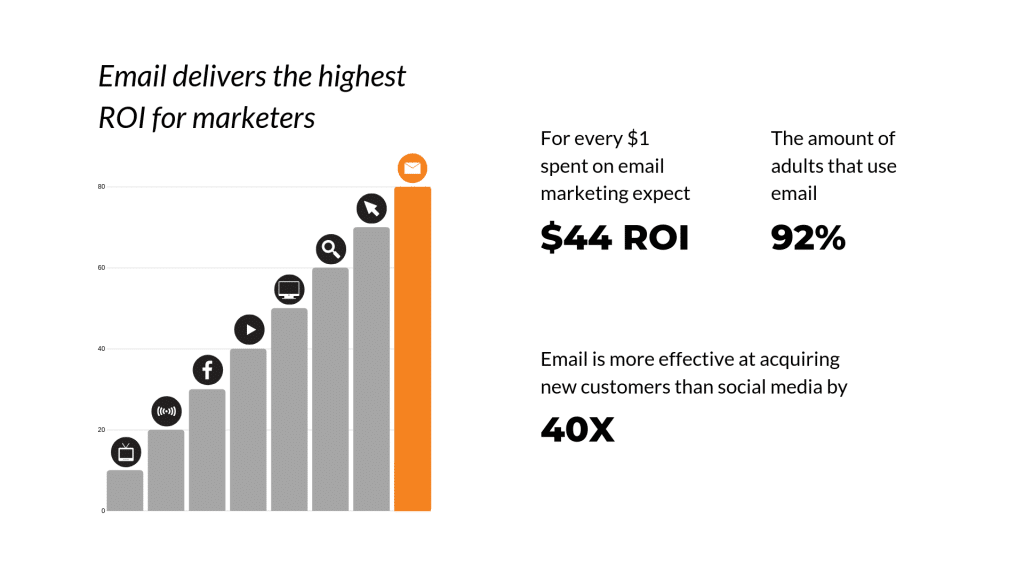
In order to reach “critical mass” in regards to Email Marketing, you really need to have at least 1,000 people on your list. Not only does this allow you to start seeing your email traffic start to generate at least some kind of results, but it also is the benchmark for creating a custom audience for Facebok ads. Anything less than a thousand, and the Facebook ad algorithm has a much harder time developing a potential audience to target.
Facebook Isn’t Ideal for Virtual Events
As much as the accessibility offers us in terms of visibility, social media is just not the ideal primary platform for virtual events. They’ve tried to step up their game and cater to virtual events more, but it’s not the best use case. It’s better used as a secondary platform.
Kenny Embry, who’s hosting the Balancing the Christian Life Lectureship series (shameless plug for my session on Saturday, July 30 at 4PM), has the right idea. Instead of hosting the entire thing on social media — where people can bounce on or off — a dedicated webinar platform forces people to stay focused. It also offers more utility for live events in terms of networking, technology, and engagement.
I don’t think there’s any question that VBS 2023 will be on a dedicated live events platform. It’s much more user-friendly, and forces people to commit to the session. Kudos to you Kenny for seeing that before me.
Where Do We Go From Here?
As stated above, VBS 2023 is already in the planning stages. We’re actively trying to drive traffic to the website and brainstorming speakers and topics for next year. Lord willing, it’ll be an event that people look forward to for months on end!
